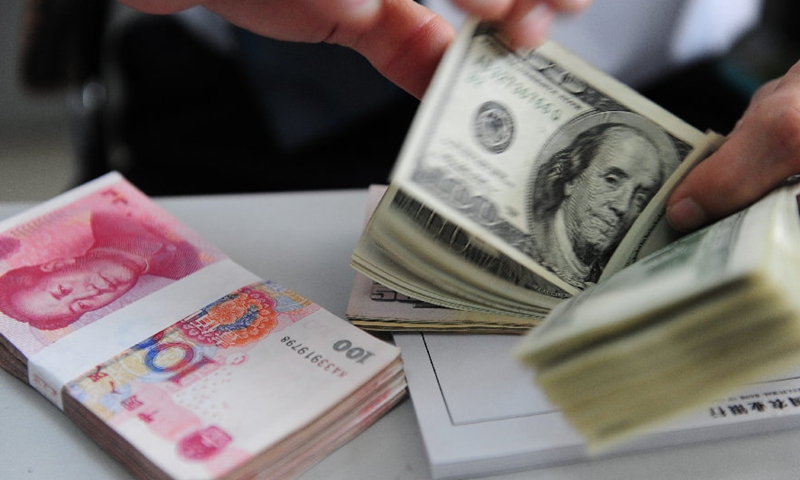Yuan set to compete with US dollar amid stronger demand for international currency diversification globally


A teller counts U.S. dollar bills at a bank in Qionghai, south China's Hainan Province.Photo:Xinhua
While the US dollar still dominates the current international monetary system, the global demand for currency diversification is growing stronger because the US Federal Reserve's policies to deal with its domestic economic recession have caused negative spillovers to developed countries including the UK, Japan and the EU in addition to many developing countries.
Reshaping the Bretton Woods System is closely related to the process of "de-dollarization." A new system requires diversified competition in such aspects including trade settlement, investment and reserves so as to balance the interests of all parties, while a new type of cooperation will be established among countries with different levels and stages of development in order to build a more inclusive international monetary system.
The discourse power of a currency reflects a country's global economic influence. Although, the Chinese yuan has limited role in international monetary system, it is expected to compete with the US dollar and develop a substitute relationship over the long run.
More efforts are needed to accelerate the yuan's internationalization, including boosting its free convertibility under the capital account and expanding the scope of yuan-denominated financial products, in a bid to give full play to the yuan's role in areas like commodity pricing, local currency settlement in bilateral trade and new-type of cross-border payment system. Thus, the yuan's standing in international monetary system could be gradually raised.
China boasts of a stable macro environment and its economy is experiencing steady growth, providing the necessary platform for the yuan's internationalization.
China's GDP grew 5.3 percent year-on-year in the first quarter of 2024. As macro-policies continue to produce positive effects, economic data including industrial value added, retail sales, foreign trade have been better than expected, while prices remain stable. Moreover, the country's growth momentum remains robust thanks to reforms in key fields and links by changing development modes, adjusting industrial structure and shifting growth driver.
Under the general principle of pursuing progress while ensuring stability, policymakers are seeking to strengthen countercyclical and cross-cycle policy adjustments, stress policy coordination and pursue a proactive fiscal policy with greater intensity and enhance its performance to deal with internal and external economic challenges.

Tian Xuan Photo: Courtesy of Tian Xuan
Recently, China issued its first batch of its 1 trillion yuan ($140.63 billion) of ultra-long special treasury bonds. Through investment in key projects, these bonds are expected to drive up effective demand, elevate market confidence and accelerate the country's economic recovery in the short term. Over the medium- and long-term, ultra-long special treasury bonds will guide capital flow into strategic areas, high-tech fields and weak industrial links to enhance the country's sci-tech innovation capability and develop new quality productive forces.Such measures, in coordination with macro-policies, will assist the development of quality innovation enterprises, spark market vitality, boost the development of the modern industrial system and the transformation of economic structure so as to contribute to high-quality economic growth.
The Central Financial Work Conference held in Beijing last October stressed the need to accelerate the building of a nation with a strong financial sector, elevating financial work to a strategic height. It matches the country's economic development goal and serves as a direction for developing China into a financial powerhouse.
This year, China has rolled out a series of policies to promote the financial opening-up and capital market reforms.
It's worth noting that the yuan's internationalization should be promoted in a "prudent and steady" approach, and efforts can be made to cement the basis of the yuan's internationalization by enhancing the yuan's capacity in servicing small and medium-sized trade enterprises via digital methods. Meanwhile, the authorities should strengthen prudential regulations, and gradually enhance the country's participation in international market governance through cross-border regulation cooperation.
The author is a vice president of the Tsinghua University PBC School of Finance.



